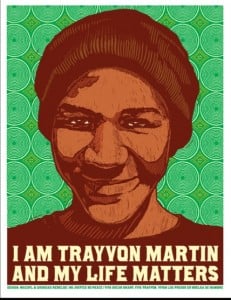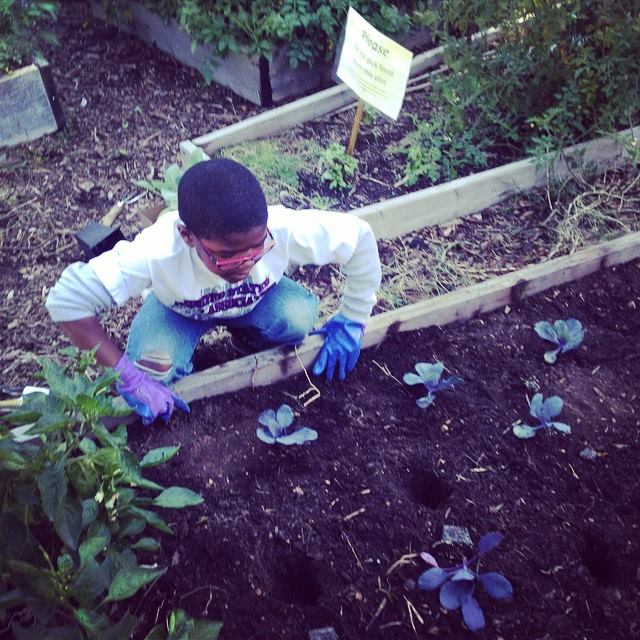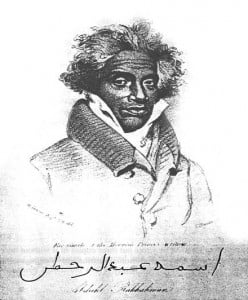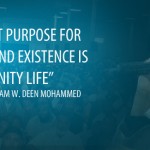Muslim History Detective’s log, 07/17/13

Ramadan, the ninth and holiest month in the Islamic calendar, is the month when the Qur’an was first revealed to the Prophet Muhammad. In addition to fasting during Ramadan, from sunrise to sunset, Muslims read one thirtieth of the Qur’an each day, so that by the end of Ramadan they have read the entire Qur’an.
This past Saturday, I happened to be on the one thirtieth of the Qur’an wherein Chapter 5, verse 8, teaches us to never let hatred, however we experience it, from others or within our own selves, lead us to the sin of acting unjustly. I tweeted this verse early Saturday afternoon, long before the jury delivered its “not guilty” verdict in the George Zimmerman case:
“O you who have attained to faith! Be ever steadfast in your devotion to God, bearing witness to the truth in all equity; and never let hatred of anyone lead you into the sin of deviating from justice. Be just: this is the closest to being God-conscious. And remain conscious of God: verily God is aware of all that you do.”
When the verdict came in later that night, it literally took my breath away, almost as if all the air had been pressed out of my lungs—not because I had not expected the outcome but because I had allowed myself to begin to hope that I would be wrong. The only thing I could do for relief was to write. So, while keeping Qur’an 5:8 close to heart, I posted the following on my Facebook page:
Feels like the weight of centuries on my chest, we’re still suffering from the weight of centuries. Takes your breath away and you have to tell yourself: Breathe! Trayvon died carrying the weight of centuries, black youth die in Chicago (and other parts of [the] USA) carrying the weight of centuries. It’s almost evil to pretend that weight isn’t there, that it’s not a part of the equation. We are a people who were LITERALLY castrated; hung from trees in front of mobs of people, including children; bombed in churches; shot in our front yards; dragged behind cars by ropes and chains; sold on auction blocks, naked with no regard to our right to dignity; ripped from our mothers’ bosoms while they were forced to care for their slave masters’ children; packed like sardines on slave ships and forced to wallow in our own excrement; our NAMES, our RELIGIONS, our CULTURE ripped away from us; forced to eat the worst parts of foods from the master, [which] negatively affect our health even today: let’s call this the legacy; refused education and beat for trying to educate ourselves; maimed and killed for running to freedom; we couldn’t even fully vote less than 50 years ago without getting beat down with dogs sicked on us and on and on and on and on. This is [part of] our American history. Do you not think it would have a devastating impact on our communities even today? Please, I don’t want to hear anybody say anything about how they can’t understand why [some] black people are upset today. We have the weight of centuries on our chest, the weight of centuries.
In the words of Charles M. Blow, a New York Times op-ed columnist, “The sadness lingers — heavy and thick, the choking kind, like acrid smoke.”
What does this history have to do with George Zimmerman? Well, the legacy of it runs deep like a chasm in the lives of African Americans, where they are all too often perceived as having inferior intellect and moral character but superiority in threat status. You see, in order to justify the mistreatment of black people for centuries, it had to be something wrong with them right, not the oppressor? The reality is, these prejudices against black people are so deeply ingrained in American culture and history that, today, you could be any race, even black, and still believe they are true!
Ask yourself, if white teens had been burgling in Zimmerman’s neighborhood, would every white teen have been suspect to Zimmerman? No, because they are human beings and each is judged on his own merit. However, black people, also human beings, are too often seen as a group, the (perceived or actual) sins of one become the sins of all. Suddenly, every black person who seems out of place, whatever that may mean, is suspect and that includes a world-renowned professor—Dr. Henry Louis Gates, Jr.—on his own front porch in predominately white Cambridge, Massachusetts. In “The Whole System Failed Trayvon Martin,” Charles M. Blow writes:
This case is about extraordinary inequality in the presumption of innocence and the application of justice: why was Martin deemed suspicious and why was his killer allowed to go home? …The idea of universal suspicion without individual evidence is what Americans find abhorrent and what black men in America must constantly fight.
If that does not hurt your soul, well…
My Saturday night post resonated with a lot of my friends and family on Facebook who were also heartsick over the verdict and frustrated that many do not understand why what happened to Trayvon Martin is so painful for us. Some with young, African American sons were particularly beside themselves, wondering what this meant for their children’s safety in the future. Others reposted my words on their pages, including one of my Christian cousins and a Pakistani-American friend. One of the people my post resonated with the most was a childhood classmate – a Nichiren Buddhist – I recently reconnected with via Facebook. Her first cousin was one of four little girls killed in the 1963 bombing of the Sixteenth Street Baptist Church in Birmingham, Alabama. In a blog post on Sunday, she wrote that she felt like I was reading her mind when she read my post.
But not all African Americans were heartsick—after all, we are not a monolith. In fact one of the harshest critics of some African Americans’ heartsick response was an African American: Muslim rapper Lupe Fiasco. Right in between tweets about his Islamic practice and various Ramadan rites, he tweeted to his nearly 1.5 million followers that black people only had themselves to blame because we do not value ourselves. Well, that is the nicer version of what he said. I will leave you to read his actual words for yourselves, including his reference to (some or all?) black people as the N-word. Some of his followers gave him a Twitter pat on the back for his “real talk” and others expressed disgust and regret for ever having supported him at all.
Without even knowing about Lupe’s tweets at the time, I anticipated the onslaught of these types of comments to come. And so I wrote the following in the comments section of my own Facebook post:
Just like with the N-word, where people say: “Hey, it’s okay to call you this word because some black people call each other this. So we can do it too.” Now we’re going to hear a whole bunch of people say: “Hey, how can we ask for justice for Trayvon when there is black on black crime?” Lord have mercy! Why is it that justice for black folks always has to be contingent on us being perfect human beings? If some of us commit a wrong, all of us are now undeserving of justice? No, Islam doesn’t teach that. Does any religion teach that? As the saying goes: “Where they do that at?” No, being a perfect people is not a prerequisite for [being on the receiving end of] justice, respect and decency toward human beings. I won’t accept that at all. That’s a real dangerous road to start traveling down.
Everywhere I turn, there are African Americans, of diverse ages, working tirelessly for their communities. It is disheartening, then, to hear African Americans perpetuating the narrative of “black pathology” and of us somehow being underserving of justice because of this perceived pathology.
The idea and discussion of so-called black pathology is nothing new of course. For example, Dr. Ishmael Reed’s 1989 article “The Black Pathology Biz,” published in The Nation, shows you how the topic is just as heated today as it was nearly 25 years ago.
The very idea that an entire race of people in America must surrender their right to justice, respect and decency on account of there being imperfect people among them, as if there are not imperfect people among all people, is beyond ludicrous and is most surely an evil. And what human being do you know is perfect anyway?
Let us get some things straight:
Not every black person is involved in black on black violence, far, far, far from it. It is ridiculous to even have to address this.
Not every black person uses the N-word, far, far, far from it. Again, it is ridiculous to even have to address this.
In 2011, according to FBI Crime statistics, 6,329 black people were murdered in the United States and 2,447 of those murders were the result of single person, single offender homicides committed by black people. In that same year, 5,825 white people were murdered and 2,630 of those murders were the result of single person, single offender homicides committed by other white people.
Now, here is the thing. There are over 42 million black people in America. In 2011, based on the numbers above, regarding single person, single offender murders, approximately 0.005% (that’s less than one percent folks!) of all the black people in America were involved in these types of black on black murders and yet these numbers are somehow an indictment of the entire black population? That same year, more whites were killed by the other whites in this type of single person, single offender situation and, yet, we would be hard pressed to find demonization of white people for the same kinds of crimes.
When a white person kills another white person, it is a person killing another person, and there is often this wondering aloud of what mental state led to this horrendous act.
When a black person kills another black person, there is less a wondering aloud about one’s mental state and more so resignation that this is just what black people do to each other.
And so, you hear comments like: You all kill each other anyway, how can you be upset about others killing you all? Yes, this has been uttered so much, in variant ways, that now some black people proudly utter it too. Hence, Lupe Fiasco’s comments on Twitter, including charging that black people’s “true enemy” is their “complacency and cowardice.” (By the way, who told that lie that black people do not care about what is going on in their communities and are doing nothing for their communities? And why are some of us swallowing it up wholesale—hook, line, and sinker?)
We must ask ourselves as a nation: Why is that we are comfortable with this kind of thinking?
We may be a nation of diverse races and ethnicities, but we are all human beings first and foremost. How have we allowed ourselves to get so low down in our humanity toward each other?
And who suffers the most?
The children.
I think now, in this moment, of a scene from the controversial 2001 film “Monster’s Ball,” where grief-stricken Leticia (Halle Berry) talks to Hank (Billy Bob Thornton) about being a good mother to her obese son who died after being hit by a car:
I was really good. I was good. I was really good. I didn’t want him to be fat like that. I do not want my baby to be fat like that because I know a black man in America, you can’t be like that…You can’t be like that in America and [be] a black man…
Leticia seemed to fear more for her child’s life regarding him being black and overweight in the eyes of racism and future prospects for “the black man” than in the danger of her child being obese from a health perspective. Because anything less than being black and perfect, whatever perfect is, can often make you less than human in the eyes of many. And being considered less than human makes you an easy target for all kinds of disrespect, injustice and hatred—even if you (Rachel Jeantel) speak three languages (when most Americans can only speak one!) and only stumble in the use of your third, not because you are uneducated, as assumed, but because you have a speech impediment that requires surgery to correct.
By Sunday, I had seen many social media comments ridiculing black people for expressions of grief and frustration on Facebook and Twitter. This prompted me to write the following on my Facebook page:
It’s okay for people to vent, or work through their feelings, in their writing. They shouldn’t be ridiculed or marginalized for that. It’s much better than taking to the streets and venting frustrations and/or anger through dangerous means. Who knows, the immediate access of FB and Twitter might have actually saved some folks from going to jail last night, seriously. The pen is mightier than the sword.
There is a saying that, “Truth, crushed to the earth, shall rise again.” Let us have our grief in this moment, too much of our suffering has been suppressed, crushed down to the earth as if it never really happened. We are often told to just get over it. That has created a dangerous, pressure cooker environment where too many young folks now lack a true understanding of our history but have an anguish inside them that keeps bubbling to the top, an anguish that is the weight of centuries, even though they cannot quite connect the dots on what is burdening them.
History is a “people’s memory,” as Malcolm X once said. History gives people a sense of “being” in this world. If we keep crushing the truth down, in what ways will it push to the top as it rises and what price will we all have to pay as a nation for suppressing it?
In Islam, history is so important that one should not even change the name of an orphan in one’s care because the child must not be separated from his or her history. History not only gives one a sense of being in the world, it also gives a sense of direction and insight into how you arrived at the moment and in what direction you should move to progress productively.
Saturday night, a verdict took my breath away. In the end though, it really was not about the court case at all. Because whether Zimmerman had been found guilty or not, one truth would have remained: Trayvon Martin carried the weight of centuries on his shoulders when he died, and part of that weight says that fear of a black man is ENOUGH to warrant the death of a black man, even if he is unarmed, even if he is an innocent child, running, alone in the dark, away from someone following him. Eugene Robinson, a Washington Post opinion writer, put it best in his article “Black boys denied the right to be young”:
Trayvon Martin was fighting more than George Zimmerman that night. He was up against prejudices as old as American history, and he never had a chance.
At one point, while still sitting in his car, Zimmerman told the 911 dispatcher, “Sh*t, he’s running.” At another point, shortly after that, he gets out of his car, you can hear the wind in the background as he walks, and the operator asks, “Are you following him?” Zimmerman responds that he is and the operator responds, “Okay, we do not need you to do that.” When the dispatcher asks Zimmerman his name, he cannot even finish saying his whole name because he is seemingly so bothered that Trayvon ran. So, he responds, “George … he ran,” instead of “George Zimmerman.” Approximately, four minutes after the call ended, 17-year-old, unarmed Trayvon Martin is dead, shot in the heart.
Let that sit with you.
https://www.youtube.com/watch?v=IT4DnTnJ3Ww
And if you are like me, and it is tearing you up inside, pressing you downward, heavy with the weight of centuries, the legacy of which can be found distressingly all around you, always remember:
Never let hatred, however you experience it, from others or within your own self, “lead you into the sin of deviating from justice. Be just: this is the closest to being God-conscious. And remain conscious of God: verily God is aware of all that you do.”
During my Qur’an reading Monday, the following verse gave me peace about this whole tragedy:
“And whatever [wrong] any human being commits rests upon himself alone; and no bearer of burdens shall be made to bear another’s burden. And, in time, unto your Sustainer you all must return: and then He will make you [truly] understand all that on which you wont to differ.” Qur’an 6:164
Indeed, the weight of centuries of oppression against an entire race of people in the United States continues to weigh our country down but we have made a lot of progress too. And there are far more good people in America, of diverse race and ethnicities, than there are those that are full of hate. It is just that so much focus gets put on the hate that it weighs our hearts and souls down, it makes us feel like we are surrounded by hate at times. We can be sad about that. We can be angry, even. But after we have worked through all that in our hearts: Onward and upward, let us continue to build community with all good people.
One of the ways to get on the road to this is building community through history. I have always believed that sharing our stories and really hearing the stories of others helps us to grow in our own humanity with respect for the very essence of human dignity. And though it may be painful, it means even really hearing and understanding the difficult stories such as that of the Paula Deens of the world too. Because this is all a part of helping us understand how we arrived at the moment we are now and how we should go forward.
http://www.youtube.com/watch?v=KiOaMELUQH0
Let us not allow systematic oppression, and its spawns, which we should all work together against in productive ways, make us commit the unjust act of condemning a whole race of people for the iniquities of a few—whether they be white, black, Asian, or whatever other term we have come up with that will never fully be able to describe the true beauty and diversity of God’s awesome creation.
***
The wide variety of links and videos embedded this article are but a snippet of the greater story and diversity of views.











